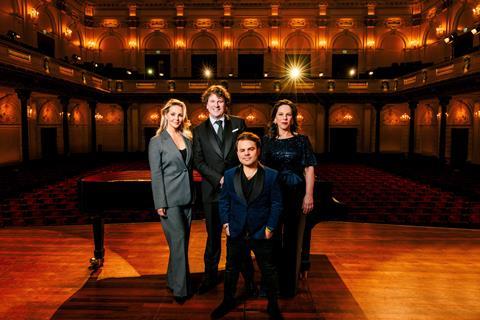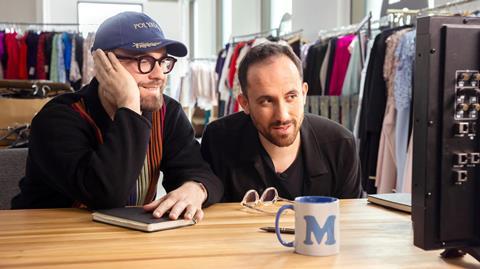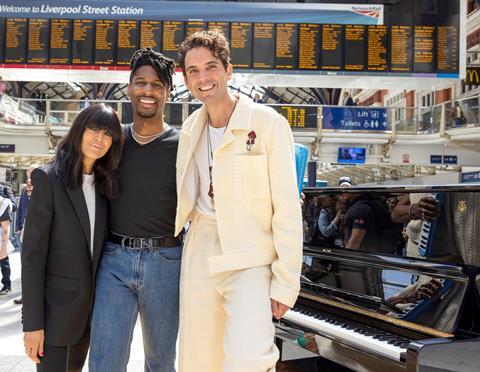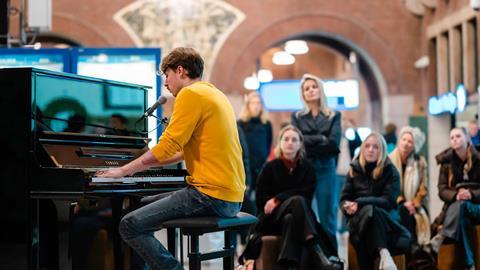Already a big hit in the UK and Netherlands, Love Productions’ The Piano is on course for further international success, with local versions launching in Spain, Germany and Denmark, and plans to conquer the US
A piano is an instrument that everybody recognises and as soon as someone sits down and starts to play, it can create magic,” says Fremantle head of global entertainment production Chris O’Dell, of the charms of its hot property, The Piano.
Some of that magic is in the simplicity of the format: under the ruse of a documentary, amateur pianists are invited to a local train station to perform for passers-by. Unbeknown to them, they are being watched from afar by a pair of celebrity experts who choose one player from each episode to perform on a much bigger stage in the series finale.
Originating from Love Productions in the UK for Channel 4, the entertainment format’s rights outside of its native market and North America were scooped up by Fremantle International in October 2023 and it has already been sold into five territories: the Netherlands, Germany, Spain, Denmark and one yet-to be announced market. Fremantle is also in talks to sell it in Asia and O’Dell hints that it has been sold to another English-speaking country too.
Pianist and piano
While the show has the veneer of a competition, at its core it is about the relationship between pianist and piano, which O’Dell hopes will appeal to many markets, whether or not they share the UK’s culture of having free-to-play pianos in public spaces.
He points to a story in the recent UK show, where one half of a couple is in the early stages of Alzheimer’s and playing the piano unlocks his memories. “We could have touched on some of those elements in a format like Got Talent, but we wouldn’t have been able to go into those kind of nuanced layers,” O’Dell says.
“The contributors don’t want to become pop stars. They just want to demonstrate their love of playing the piano”
Chris O’Dell, Fremantle
“The mainstream talent shows are about people wanting to showcase their talent to the widest possible world, but The Piano isn’t about that. The contributors don’t want to become pop stars. They just want to demonstrate their love of playing the piano and how that has changed or improved their lives. For them, that is the beginning and end of the journey.”

Germany and Spain launched their respective iterations of the format in September, while Denmark is currently tuning up its version for TV2.
De Piano aired earlier this year on RTL 4 in the Netherlands, where it repeated the ratings success of the UK show. Produced by Fremantle label Blue Circle, the launch pulled in an impressive 1.1 million/18.5%, 57% up on the broadcaster’s average primetime audience and topping the list of non-news shows on the day across all key demos.
HOW GERMANY CAME ON BOARD THE PIANO
Marcel Amruschkewitz, head of programming at German free-to-air broadcaster Vox, immediately saw how The Piano would complement the broadcaster’s entertainment slate, which also includes The Best Singers and First Dates Hotel.

“Musical entertainment and powerful, emotional stories about everyday people are baked into Vox’s DNA,” he tells Broadcast.
Amruschkewitz’s confidence in the show is borne out by scheduling it in the same Tuesday night slot that The Best Singers occupies in spring. The Piano will broadcast weekly, with episodes available seven days in advance on its RTL+ VoD platform.
The commissioner hopes that German viewers will tune in to the show in the same droves that audiences in the UK and the Netherlands did for their respective versions.
“I am sure that viewers will appreciate the varied and heartfelt storytelling,” he adds.
The last UK series, which launched on Sunday 28 April, averaged 2.4 million (13.7%) after 28 days.
One challenge presented by the format is that not all of the countries adapting it have the culture of public piano playing that has emerged in the UK in the past 20 years.
Welcome curiosity
Bianca Barth, executive director of development at Fremantle-backed UFA Show & Factual, which is behind The Piano Germany, says the set-up drew much interest from train commuters and passers-by, with many enquiring as to what the team were doing. She hopes this curiosity is reflected in the TV audience.
“In Germany, a piano is just not something that you would expect to see, walking into a train station,” she says. “Hopefully, it makes people stop for a moment and tune in and think, ‘What are they doing there? Why is there a piano at the train station?’”
“I was always very nervous when we revealed to them what was really happening because we’re Germans and we take things very seriously”
Bianca Barth, UFA Show & Factual
Another key cultural challenge for Barth’s team was how German contributors would react to the white lie that they were taking part in a documentary about public pianos but were, in fact being, watched by experts Mark Forster and Igor Levit.
“I was always very nervous when we revealed to them what was really happening because we’re Germans and we take things very seriously,” she says. “I worried they wouldn’t go along with it, but I was worried for nothing because everybody was amazed and really happy to be part of it.”
UFA stuck as closely to the parent format as possible, emphasising the pianists’ stories rather than the “soft” competition element. Barth remarks that the show is not typical of German entertainment formats: “It’s not loud, it’s authentic, heartfelt and emotional – it’s totally different from what you first assume.”
Emotional focus
The producers of Spain’s El Piano, Atresmedia Televisión with Fremantle Spain, don’t stray too far from the original format either. Although public pianos are also not a mainstay of Spanish train hubs, the producers retain the subterfuge of inviting contributors to take part in a documentary.
However, they have changed one key facet of the show: the prize. Instead of inviting one pianist in each episode to perform at a large concert hall, they give each episode’s ‘winner’ a piano to take home and the judges – Mika and Pablo López – each select a contributor to perform at one of their own concerts.

“This approach is a significant difference and a global first,” says Fremantle Spain chief executive Mario Briongos.
Like Barth, Briongos says that El Piano sticks out in the competitive local TV market and praises Atresmedia for the “bold move” to adapt it.
“It’s not your typical primetime show; the competition in Spain is fierce, and this is a different kind of format. It’s not about judging someone’s musical talent or skills; instead, it’s more about ‘emotainment’ – a show that focuses on emotions, where the piano is a vehicle for telling people’s stories,” he explains. “It’s something new and different, and we’re hopeful it will be well received.”
The appeal of the show across different countries is ultimately down to the appeal of the instrument itself, says O’Dell. Pianos are not as accessible as guitars or violins, but by placing them in busy train stations, it allows anybody to tinkle the ivories and for the audience to witness a free performance.
He adds: “The power of people playing the piano can stop passers-by in their tracks and let them have a moment to take a different view of life. That’s a really powerful thing.”
THE PIANO UK: MOVING ON FROM THE SURPRISE ‘TWIST’
As other countries revel in the initial twist that the pianists are, in fact, taking part in a competition and not being filmed for a documentary, Love Productions has already had to figure out how to adapt when it comes to series two, when contributors and audiences are in on the secret.
Richard McKerrow, the format’s creator and chief executive of Sky Studios-owned Love Productions, says amid the team’s efforts to land series one, little thought was given to how a second series would work. When C4 recommissioned the format, the team had to drill down into what viewers wanted and concluded that it was the music, the people and the stories that struck a chord.
“The surprise element was useful to sell the show, but it was not its heart and soul,” he explains. “I believe in not shying away from the problem, which is why Claudia [Winkleman] addresses it at the top of the second series.”

The third series will introduce another key change with US musician Jon Batiste joining as a celebrity expert, replacing Lang Lang, whose schedule prevented him from taking part. McKerrow says: “Jon was drawn to The Piano because of the emotion at the centre of the format.”
Love retains the rights to The Piano for North America through its US base, which also produces The Great American Baking Show, the local adaptation of Bake Off.
McKerrow says there are “ongoing conversations” with US broadcasters to adapt The Piano, a prospect that excites the indie boss. He explains: “The US has incredible music traditions. We discovered in series two that cities like Liverpool and Manchester have their own traditions; when you think of transporting that to America and taking The Piano to Chicago, New Orleans and Austin, it’s a great way of showcasing that musical heritage.”






























No comments yet